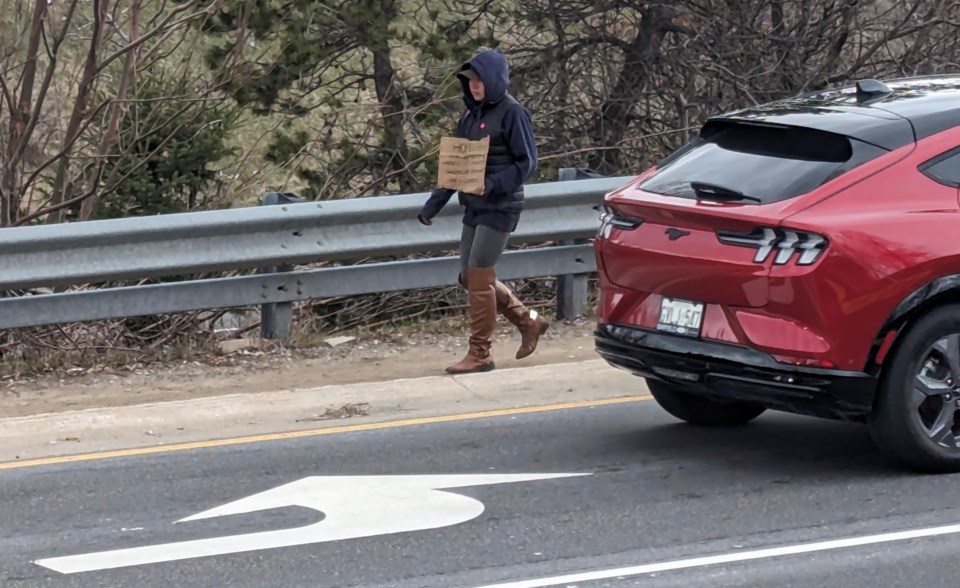Editor's note: BarrieToday is taking a look back at some of our top stories from 2024. This article was originally published on April 8.
Could a new court ruling spell change for Barrie’s panhandling laws?
Last week, an Ontario judge struck down sections of the province's panhandling law as unconstitutional. The case was launched in 2017 by the Fair Change legal clinic against the Safe Streets Act.
It prohibits soliciting in an aggressive manner, specifying six ways panhandling is defined as aggressive, and it bans soliciting a "captive audience," setting out six locations which meet that definition.
Superior Court Judge Robert Centa ruled last week that most of the ways the law defines aggressive solicitation violate the presumption of innocence, and prohibiting panhandling in certain locations violates freedom of expression rights.
Almost a year ago, Barrie city council passed a direct motion addressing chronic homelessness and enhancing public safety. It also prohibits payments to panhandlers on city streets, intersections and highway ramps, placed signs on city off-ramps to discourage panhandling or financial support, and encourages donations to the local social service agencies instead.

“After this ruling, it is clear that current prohibitions on panhandling in Barrie's bylaws are unconstitutional and are a complete waste of valuable public resources," said former city councillor Keenan Aylwin, a member of the Barrie Homelessness and Housing Justice Network, who also works as a harm reduction worker in Barrie. "Barrie should invest in social and supportive housing instead of punishment and policing.
“Barrie city council has a moral and legal obligation to respect the (Canadian Charter of Rights and Freedoms) rights of all residents,” he added. “By failing to act, they are opening up the municipality to potential litigation, costing taxpayers and wasting even more public resources."
Barrie Mayor Alex Nuttall, the direct motion’s architect, was brief with his comment on the court’s ruling.
“We respect any decisions made by the judiciary, but based on conversations with citizens, the sentiments of the judiciary and the general populace are not in alignment,” Nuttall said.
Fair Change argued the Safe Street Act violates several charter rights, including freedom of expression and the right not to be subjected to cruel and unusual punishment.
Centa didn’t rule entirely for Fair Change, upholding a ban on walking onto a street to ask drivers for money — but struck down the other ways the law defined soliciting a "captive audience," including where people are waiting to use a bank machine.
"Soliciting is of fundamental importance to persons in need and has a real social value,” he wrote. “Even if the presence of persons soliciting is annoying or even offensive, a blanket ban on all solicitations is not a proportional limit on freedom of expression.”
“This ruling should be a wake-up call for Barrie city council and municipalities across Ontario who have bylaws on the books that violate the charter rights and human rights of people experiencing homelessness,” Aylwin said. “Barrie should do a comprehensive review of all bylaws to ensure they are charter compliant.
“This ruling is a recognition of the fact that survival should not be criminalized. These types of law are meant as a distraction from the monumental failure of all levels of government to address poverty and the housing crisis,” he added. “These types of laws also dehumanize people who need support. People living in poverty and people who are unhoused are our family, our friends and our neighbours. They deserve love, respect and support, not criminalization, dehumanization and punishment."
Aylwin said homelessness and poverty are "not individual failures."
"They are systemic issues caused by government policies that prevent people from gaining access to housing, decent wages and adequate social services and supports,” he said.
Barrie city council’s May 2023 motion also addresses drug addiction, mental health, public safety, shelter, counselling and feeding the hungry, along with housing the homeless, while committing as much as $825,000 to these measures last year and this year.
Rebecca James-Reid, general manager of Access Barrie, said city staff monitor and have continued to keep council updated on the changing legal landscape and court decisions that related to attempts to address panhandling and encampments.
— With files from Canadian Press



